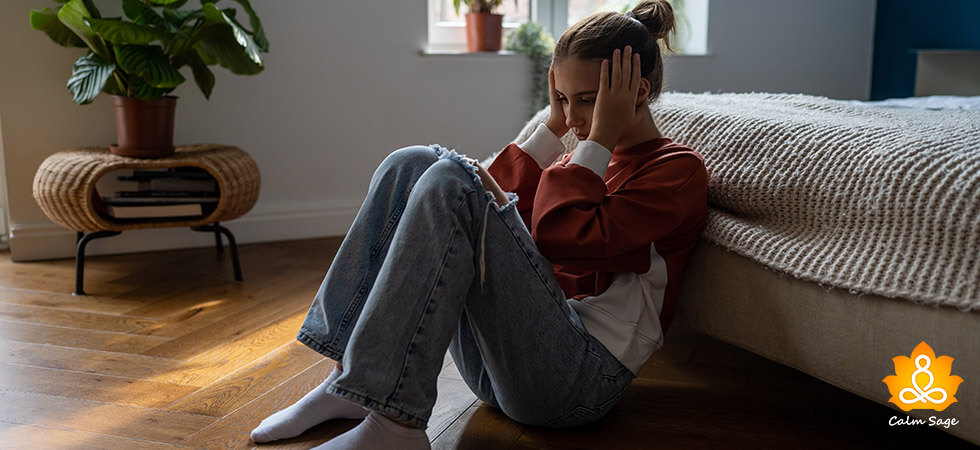Can Reading Help You Cope With Anxiety? This Is What Research Suggests!

Reading is not just to sharpen the mind or increase knowledge but can also play a major catalyst in reducing stress and anxiety. It’s a powerful tool that can help treat many mental health conditions including anxiety, depression, and stress.
Anxiety and depression are conditions that can make you retreat into yourself, feel isolated, and socially withdrawn. And while these conditions may make you believe you’re the only one who feels like this, it’s not. You are not the only one who feels like this.
Curling up with your favorite book is not only self-care but it can also care for your mental and emotional health. In research over time, it has been suggested that reading reduces anxiety and stress, significantly.
Reading fiction, especially, engages your mind and fosters your imagination. When you’re focused on one activity that brings forth meditative-like qualities, your brain focuses on a single task, providing anxiety relief and enhancing relaxation.
If you struggle with anxiety disorders, chronic stress, and even depression, then the road to recovery might look a lot like a single plank bridge with no lanterns lighting your way. Luckily, reading, as an activity (or a supportive intervention) can be a good treatment choice.
Let’s take a look at how reading reduces anxiety and the many (not-so-hidden) benefits of reading!
Does Reading Help With Anxiety?
In a study by the University of Sussex, it was found that 6 minutes of reading reduces stress by at least 68%. In the research, it was also found that reading for anxiety relief worked more efficiently than listening to music, drinking calming tea, or walking it off.
What the researchers believe is that reading a book requires concentration that helps distract the brain from anxious and ruminating thoughts, subsequently reduces heart rate, and calms the nerves caused by the stress response.
Not only that but reading also engages the creative mind and increases the flow of creativity that calms down the parts of the brain responsible for anxiety. While it may take some time for the stress response to calm, give it time.
As you begin to feel calm, the amygdala (responsible for our emotional response) also becomes less active, and the prefrontal cortex (responsible for decision-making and rational thinking) gets activated. This function allows you to put a break to your anxiety and hand over the control of your anxious thoughts.
Dr. David Lewis, who conducted the study said,
“It doesn’t matter what book you read, by losing yourself in a thoroughly engrossing book you can escape from the worries and stresses of the everyday world and spend a while exploring the domain of the author’s imagination.”
The Benefits Of Reading To Cope With Anxiety
1. Relaxes And Calms You Down, Physically
Anxiety disorder might be a mental health disorder but just like other disorders, it also manifests as physical symptoms such as high blood pressure, increased heart rate, sweaty palms, and more. In such cases, reading can slow your heart rate down, ease muscle tension caused by excessive stress, and can enhance relaxation (no matter if you’re reading a suspenseful book).
2. Decreases Feelings Of Isolation
When you feel isolated, the world might look like a daunting place, however, reading can bring you a sense of relief and help you find your place in the world. In a recent 2022 study, it was found that reading can help people experience Hikikomori, a Japanese concept of social withdrawal.
In the study, it was found that people who read fictional books were less likely to experience emotional stress and more empathy.
3. Increases Compassion For Yourself (And Others)
For many, feelings of guilt, shame, and anxiety are all passengers in the same boat. People struggling with anxiety disorder are likely to be hard on themselves more than others, just like the way many people with mental health disorders are un-empathetic and self-critical towards their condition.
Reading, on the other hand, can increase compassion and empathy not only for yourself but for others as well. It can help you change the way you see yourself and your plight.
4. Presents You With A New Perspective
Reading is an activity that lets you take a peek into another person’s life and experiences, whether they are fictional or real. Reading is one of the best (and easiest) ways to change your perspective and put yourself in others’ shoes. When you look at the same situation from another’s eyes, you learn a new perspective that you might’ve skipped in your everyday life.
5. Improves Mood
Curling up with a good book can be another great way to improve your mood and boost feelings of optimism. In a 2019 study, it was found that children (aged 7-12) had a relationship between reading and feelings of hope.
Hope, in children, can be a positive influence when it comes to their mental health and well-being. Even older adults, living in nursing homes, reported a connection between feeling optimistic and reading.
6. Helps Cope With Grief
Reading is also a good activity that can help children and adults, alike, cope with grief. In a 2021 study, it was found that children whose fathers died by suicide found reading a good way to cope with the feelings the event brought.
Reading helped them feel less confused about the deaths, understand that they are not alone, and engage better (and openly) with other adults in their lives.
Wrap Up
Reading is more than just a relaxing activity and self-care practice. It’s also an important activity when it comes to healing mental and emotional wounds. Curling up with a good book not only enhances feelings of relaxation and compassion within but can also serve as a comfort activity for people living with anxiety, stress, and even depression.
Reading can increase empathy, boost social connections, increase feelings of hope or optimism, and even help you cope with raw and difficult emotions like grief.
Reading should not be considered a primary treatment for anxiety relief or stress but a supportive activity. If you’re struggling with an anxiety disorder or depression, it is recommended that you reach out to a professional for a diagnosis and treatment.
For more, you can write to us at info@calmsage.com or DM us on social media. You can also share your thoughts on how reading reduces anxiety and the many mental and emotional benefits of reading in the comments below!
Take Care!




















